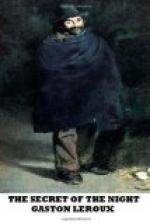Rouletabille stopped a moment to judge of the effect produced. It was not good. The face of his august listener was more and more in a frown.
The silence continued, and now the reporter did not dare to break it. He waited.
Finally, the Emperor rose and walked forward and backward across the room, deep in thought. For a moment he stopped at the window and waved paternally to the little Tsarevitch, who played in the park with the grand-duchesses.
Then he returned to Rouletabille and pinched his ear.
“But, tell me, how have you learned all this? And who then has poisoned the general and his wife, in the kiosk, if not Natacha?”
“Natacha is a saint. It is nothing, Sire, that she has been raised in luxury, and vows’ herself to misery; but it is sublime that she guards in her heart the secret of her sacrifice from everyone, and, in spite of all, because secrecy is necessary and has been required of her. See her guarding it before her father, who has been brought to believe in the dishonor of his daughter, and still to be silent when a word would have proved her innocent; guarding it face to face with her fiance, whom she loves, and repulses because marriage is forbidden to the girl who is supposed to be rich and who will be poor; guarding it, above all — and guarding it still — in the depths of the dungeon, and ready to take the road to Siberia under the accusation of assassination, because that ignominy is necessary for the safety of her father. That, Sire — oh, Sire, do you see!”
“But you, how have you been able to penetrate into this guarded secret?”
“By watching her eyes. By observing, when she believed herself alone, the look of terror and the gleams of love. And, beyond all, by looking at her when she was looking at her father. Ah, Sire, there were moments when on her mystic face one could read the wild joy and devotion of the martyr. Then, by listening and by piecing together scraps of phrases inconsistent with the idea of treachery, but which immediately acquired meaning if one thought of the opposite, of sacrifice. Ah, that is it, Sire! Consider always the alternative motive. What I finally could see myself, the others, who had a fixed opinion about Natacha, could not see. And why had they their fixed opinion? Simply because the idea of compromise with the Nihilists aroused at once the idea of complicity! For such people it is always the same thing — they never can see but the one side of the situation. But, nevertheless, the situation had two sides, as all situations have. The question was simple. The compromise was certain. But why had Natacha compromised herself with the Nihilists? Was it necessarily in order to lose her father? Might it not be, on the contrary, in order to save him? When one has rendezvous with an enemy it is not necessarily to enter into his game, sometimes it is to disarm him with an offer. Between these two hypotheses, which I alone took the trouble to examine, I did not hesitate long, because Natacha’s every attitude proclaimed her innocence: and her eyes, Sire, in which one read purity and love, prevailed always with me against all the passing appearances of disgrace and crime.




